Adrian Collins's Blog
November 23, 2025
My Obsession with my Dagger Collection – and how that led me to Fantasy Storytelling
I was sitting in one of my extra classes at Oxford about the Timurid-Mughal dynasty when I learned a lesson that quietly reshaped the way I think about storytelling: the idea of social history. Instead of studying the past as a neat, linear trajectory – an approach that too often reflects an Orientalist, colonial way of ordering the world – social history urges us to understand an era through the stories of its people, objects, and the intricate social contexts that bind them. It is a discipline of cultural syncretism, local economies, administration, class, and community. It tells us more about how an empire actually functioned than any list of emperors ever could. And in an unexpected way, it mirrors what I love most about fantasy. The genre is not just about applying presentism – our own moral ideas onto another grouping; it is about reading worlds that make us think, whose value systems might clash with our own, whose moral spectrums explore possibilities beyond our comfort, and whose conflicts make sense only when we immerse ourselves in their social structures and material cultures.
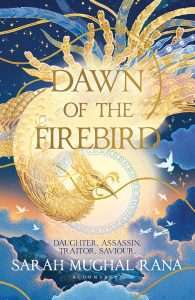 That is how I began shaping the world of Dawn of the Firebird: by looking to the objects people traded and revered, by letting something as small and storied as a dagger reveal its story.
That is how I began shaping the world of Dawn of the Firebird: by looking to the objects people traded and revered, by letting something as small and storied as a dagger reveal its story.
My obsession with daggers began long before I ever owned one. During my martial arts training, I was mastering stances with the goal of eventually wielding a longsword and other blades, but it wasn’t until I began traveling through northern Pakistan that I truly fell in love with the artistry of small weapons. First, daggers shaped the very architecture of trade in Dawn of the Firebird, especially the hustle and bustle of a bazaar. This is where my protagonist, Khamilla, begins to understand that objects do not respect borders, even when empires pretend they do. In her world, a single blade can travel farther than a diplomat, slipping across frontier borderlands and carrying stories, wealth, and power with it. Through these objects, Khamilla learns that trade is the hidden engine behind several empires vying for dominance across prized trade routes: the goods that move through the Camel Road fuel these economies, shift alliances, and even spark the very wars she finds herself caught between.
I still remember seeing a Timurid-Mughal dagger carved from jade and red jade, a material sourced from Kashgar in present-day East Turkestan, carried across mountain passes by traders who linked the Timurid-Mughal Empire to China. That single blade revealed an entire economic and cultural ecosystem: China supplied the nephrite; Mughal artisans transformed it into courtly masterpieces; and by the 18th century, Chinese craftsmen admired the work so much that they began imitating Mughal designs. The spread of finely crafted daggers across Türkiye, Persia, Arabia, and modern-day Pakistan wasn’t just about weapons, it was evidence of the lives of merchant trade networks, shared artistry, and artisans in mutual beneficiary relationships across borderlands.
Understanding how much history a single object could hold inspired the Camel Road in Dawn of the Firebird: a vast trade network shaped not by empires but by shepherds, merchants, materials, and the power of objects crossing borders and evolving, that contradicts the idea of hard borders in our modern day and age.
 Author Sarah Mughal Rana
Author Sarah Mughal RanaSecond, it was by encountering objects from the old Islamicate world, that I realised the dagger was the perfect marriage of my two worlds: the discipline of martial arts and the depth of history. Thus, my dagger collection shaped the magic system in Dawn of the Firebird, particularly through the designs etched into their hilts. In the Islamicate world, jewelled daggers were more than weapons, in the Ottoman and Timurid-Mughal empire, they were ceremonial gifts from the emperor, bestowed upon nobles for military victories or loyalty. For the Timurid-Mughals, the blade was a declaration of rank and favor within the mansabdari system, where numerical titles determined a noble’s status, cavalry command, and place in the imperial hierarchy. But status was never just numerical; it was actually visual. In court, a courtier’s proximity to the emperor, or the material of a blade, the fineness of its carvings, the jewels set into its hilt, high-relief leaves and petals – all of it signaled a ranking in power. That idea, that objects can carry rank, became the cornerstone of my magic system.
In Khamilla’s world, her own ivory hilt marks her as a Zahr-zad, descended from the emperor’s clan. But as the story progresses into the rival empire, her hilt transforms to their designs: gold threading, raven motifs, and even slashes etched into the grip, to indicate her martial status in the magical military academy. In my fantasy novel, those designs don’t just indicate rank; they evolve with Khamilla herself, recording her shifting loyalties.
A dagger in a fantasy world shouldn’t exist just for aesthetics. Good writers use objects like these to build their worlds from the ground up, to reveal social and political realities. And in Dawn of the Firebird, the dagger is more than a weapon, it’s the bond that ties together trade, power, identity, and the shifting world Khamilla must learn to navigate, alongside the reader.
Read Dawn of the Firebird by Sarah Mughal RanaThe post My Obsession with my Dagger Collection – and how that led me to Fantasy Storytelling appeared first on Grimdark Magazine.
November 22, 2025
REVIEW: A Graveyard for Heroes
Gorgeous imagery, great character work, and a world rife with religious and political tension, Michael Michel’s A Graveyard for Heroes is a dark, successful follow up to book one’s The Price of Power. The amount of POV’s are growing, the stakes rising, and the skies darkening in this indie gem.
“Tyrants oft arrive in velvet slippers but they always leave in iron-shod boots.”
 A Graveyard for Heroes centers on the repercussions of the battles won and lost in The Price of Power. Ishoa must pick herself up from the ashes and snow; Barodane seeks to right his wrongs, but he finds living harder than waiting to die; Thephos has become an Awakened, but now he must find out what that means and what his powers are, not easy for a suicidal pig farmer. With these three POV’s, and two new ones of Valka, a Scothean general and spy & Zadani, a cook with revenge on her mind and targets for her knife, Michel’s A Graveyard for Heroes is a violent, dark, character-driven story.
A Graveyard for Heroes centers on the repercussions of the battles won and lost in The Price of Power. Ishoa must pick herself up from the ashes and snow; Barodane seeks to right his wrongs, but he finds living harder than waiting to die; Thephos has become an Awakened, but now he must find out what that means and what his powers are, not easy for a suicidal pig farmer. With these three POV’s, and two new ones of Valka, a Scothean general and spy & Zadani, a cook with revenge on her mind and targets for her knife, Michel’s A Graveyard for Heroes is a violent, dark, character-driven story.
Michel’s bread and butter is his character work, and he’s at the top of his game here. Barodane may have been the MVP of book one, but A Graveyard for Heroes two stand-outs are Ishoa & Valka. Ishoa is granted the most screentime in this book and goes on a nice training arc for both martial prowess and what it means to be a leader, where Valka’s tale is an intricately woven one of spies, betrayals, threats, blackmail, politics, and religious mechanations. Grimdark fans will feel particularly at home with Valka.
From a side character perspective, A Graveyard for Heroes heralds one of the most interesting antagonists I’ve ever read. Siddai is a child who is known as the Arrow of Light, a messiah who none can deny his power or wisdom. Even as assassins bear their knives and spies whisper their secrets, he carries on with intelligence, grace, and an undercurrent of malice seen only in figures like Monster’s Johan Liebert.
The imagery in A Graveyard for Heroes is both gorgeous and disgusting. Michel paints beautiful landscapes and bloody viscera with the same level of distinct, visceral touches. You can see men dying, smell roasting pork, hear sounds of suffering, and taste both glory and bitter defeat.
Another aspect of the book that deserves praise is the prose. Despite the length of A Graveyard for Heroes, Michel’s pen never wavers from a prose perspective. Often times with books this large, you notice portions where the author threw something on the page to keep things moving or didn’t fully go over each paragraph to make sure the flow, eloquence, and word choice were there, but we do not see that laziness in A Graveyard for Heroes. The length of the book is ambitious, but Michel delivers on that ambition.
“ A single experience, no matter how horrible, does not condemn all experiences. Just like one failure on your part, Isha, does not condemn you to a life of failure. You must face forward to see your path. You must let the past go.”
My main complaint with A Graveyard for Heroes is that one of the POV’s simply didn’t work for me. That’s a fairly common complaint in any multi-POV book—and it may be a case of personal preference—but Zadani the cook I just couldn’t invest in fully. Characters who can always tell when others are lying & revenge plot lines rarely work for me, and when you compare her parts to characters like Valka, Ishoa & Barodane, she just doesn’t reach those heights.
A few secondary complaints is that while we do have some excellent new voices, one of the main POV’s/plotlines from The Price of Power does not appear in A Graveyard for Heroes. I’m not overly sure why this character was cut from the sequel, but their presence was missed. Finally, I found some of the dialogue exchanges from secondary antagonists a bit cliche and over-the-top villainous. It’s noticeable only due to how strong the rest of the dialogue is, but there are brief moments in this thick tome that could have used a touch more polish.
All in all, however, this is one of the best sequels I’ve read and a leap in every discernable aspect of writing. Plot, prose, character work, dialogue, world-building, action, all of it is an improvement from the already excellent The Price of Power. Michael Michel is promising grand, ambitious things, and with the skill shown in A Graveyard for Heroes, I suspect the series shall go down as my favorite indie series of all time. Character-driven readers, fans of Abercrombie/GRRM/X-Men, and grimdark fans alike should invest now in this indie series.
Read A Graveyard for HeroesThe post REVIEW: A Graveyard for Heroes appeared first on Grimdark Magazine.
November 21, 2025
REVIEW: Murder in Retrograde by Greg Hickey
Murder in Retrograde by Greg Hickey is a science fiction thriller novel set in a dystopian future where the environment has collapsed but big corporations are still competing for who can win the public relations game. Cyberpunk and noir detective fiction have gone together since Blade Runner with some of my all-time favorite novels pulling from the combination. So, I’m the kind of audience this book is aimed at.
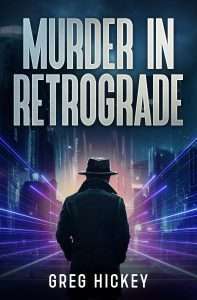 Murder in Retrograde’s premise is that the future is devastated by global warming to the point that it is a felony to burn fossil fuels. Private Detective Marcus Carver is invited to a billionaire rocket executive’s home and told that his next-door neighbor’s estate have violated this rule. Marcus is suspicious from the start that this is just a way for his employer to strike against a rival but takes the job, soon finding himself involved in a complicated cover up involving murder, gangs, and cybercrime.
Murder in Retrograde’s premise is that the future is devastated by global warming to the point that it is a felony to burn fossil fuels. Private Detective Marcus Carver is invited to a billionaire rocket executive’s home and told that his next-door neighbor’s estate have violated this rule. Marcus is suspicious from the start that this is just a way for his employer to strike against a rival but takes the job, soon finding himself involved in a complicated cover up involving murder, gangs, and cybercrime.
There’s strong Raymond Chandler influence throughout Murder in Retrograde with Marcus Carver resembling Phillip Marlowe in many respects. He is a private detective abiding by his own code but surrounded by corruption that disgusts him. He’s willing to bend the rules but is not going to break them for money or a pretty face, which mystifies most of the characters around him. I like this take on noir because rather than heroic, it makes us question just how much the protagonist is good versus stubborn.
The conspiracy that Marcus deals with is also one that is just grounded enough in the scifi environment that watching it untangle is fascinating. There’s Tongs, the DA’s office, radical environmentalists, competing corporations, and put-upon servants who aren’t paid nearly enough to deal with this crap. A lot of this could happen now but Greg Hickey envisions use of things like eco-friendly technology, smart houses, self-driving cars, holographic technology, and faked video to complicate the mystery.
The supporting characters are also an interesting collection with a wide variety of classes and identities. Everyone acts in a realistic motivation ranging from money to respect. I also appreciate that the author remembers a fundamental truth that many detective fiction writers forget: people lie repeatedly then don’t necessarily confess when they are confronted with the “truth.”
In terms of darkness, I think this is medium in terms of cyberpunk. There’s only a handful of murders throughout the book but the implications are those who attempt to do anything about them are tilting at windmills. The lowered level of violence and corruption versus, say, Cyberpunk 2077 does make each of them count, though.
The line between science fiction thriller and cyberpunk is a thin one but I think Murder in Retrograde hits squarely in the center. The world is one ruled by incredibly rich people who are above the law, the cops are useless, and technology has not made things better but only given both new ways of oppressing the little guy. The goal of the protagonist is not so much justice as to gum up the works of the system enough to sour their victory.
In conclusion, this is a great novel if you’re looking for a near-future murder mystery with a likable protagonist in a dystopian but plausible future. It is extremely enjoyable and I look forward to future adventures of Marcus Carver.
Read Murder in Retrograde by Greg HickeyThe post REVIEW: Murder in Retrograde by Greg Hickey appeared first on Grimdark Magazine.
November 20, 2025
REVIEW: Kingdoms of Death by Christopher Ruocchio
Christopher Ruocchio’s Kingdoms of Death, book four of The Sun Eater flips the series on its head. What if Hadrian is wrong about being able to negotiate with the Cielcin? What if his new found powers were used against him? What if there’s another chose one? Startlingly bleak, full of torture, and gorgeous prose interlining the book like silver thread, Kingdoms of Death moves beyond simple darkness and into the black, cold void of space.
“I had defied the Prince of Princes, and all would see the consequences of that defiance.”
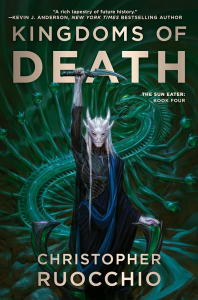 Kingdoms of Death is absolutely brutal. Not in the military way of armies and blood (although, we do have that here), but in the way of scalpels and starvation. Most of this book revolves around the trapped Hadrian being tormented and dialoguing with his tormentors. As a premise, it sounds both boring and vulgar, but it works shockingly well. Hadrian and the leader of his captors have dialogue exchanges that I could have read hundreds of pages of, and Ruocchio’s prose keeps everything sharp and compulsively readable.
Kingdoms of Death is absolutely brutal. Not in the military way of armies and blood (although, we do have that here), but in the way of scalpels and starvation. Most of this book revolves around the trapped Hadrian being tormented and dialoguing with his tormentors. As a premise, it sounds both boring and vulgar, but it works shockingly well. Hadrian and the leader of his captors have dialogue exchanges that I could have read hundreds of pages of, and Ruocchio’s prose keeps everything sharp and compulsively readable.
Instead of battle and victory, Kingdoms of Death is suffering and defeat. Pain and torment. Anguish. Misery. To some, that will be off-putting, but there is beauty in the wretchedness. Hadrian’s relentless will to live is equal parts inspiring and tragic. The themes of survival and grief sharpened to a fine point. A plot meticulously crafted. Kingdoms of Death is a big success in what it seeks to do.
What surprised the most about Kingdoms of Death is the improvement in Ruochioo’s prose. He’s always been in the upper echelon, but the way his pen weaves, shines, and darkens, it can only be compared to silver or moonlight. It’s beautiful stuff, even though the book is pretty relentlessly dark.
This is the shortest book in The Sun Eater, and it’s also its most profound. It’s quiet, it’s grief heavy, it’s the silent step at night. The character study of Hadrian has changed direction and grown even more, and the thematic work is genius. Ruocchio is breathing rarefied air here.
Finally, what’s so impressive in Kingdoms of Death is its ability to make you feel. By the end, you’ve had your heart broken and your anger stirred to a full on maelstrom. That’s the mark of a truly great book, and a truly great cast of characters.
“We are all shaped by our suffering. That we are only what we are is ever our chiefest sin.”
Kingdoms of Death is a great book, but I did have a small critique of the ending. Originally, Ruochhio intended for both Kingdoms of Death and Ashes of Man to be one book. It grew too large, and as a result, he had to split them into two tales. While Kingdoms of Death is a complete tale, the tonal shift from 75% on felt a bit sudden, but we’re also not given enough time to fully be immersed in the switch.
It’s a small critique, and for Sun Eater fans who have been hoping Ruocchio goes just a bit darker, the prose gets even better, and the characters even more nuanced, making this is a home run. Kingdoms of Death is not the roaring applause and rousing victory of Demon in White, it’s the whisper in the night. Horrifying, bleak, gloomy, and melancholic, Kingdoms of Death is a treat for sci-fi, Sun Eater, and grimdark fans alike.
Read Kingdoms of Death by Christopher RuocchioThe post REVIEW: Kingdoms of Death by Christopher Ruocchio appeared first on Grimdark Magazine.
November 19, 2025
REVIEW: The Works of Vermin by Hiron Ennes
Three years ago Hiron Ennes burst onto the speculative scene with the startlingly original and compelling post-apocalyptic sci-fi, gothic suspense, and body horror mash-up Leech, essentially The Thing meets Rebecca, which gave us the memorable POV of a parasite. It was the kind of debut that fast forwards an author to must-buy status, and now they’ve returned with The Works of Vermin, and though my expectations were higher than the career aspirations of a six year old, I simply wasn’t prepared for the frankly genre-defining masterpiece that landed in my eyeballs. This is a book that gives us, in Tiliard, a fantasy city for the ages—as grotesquely monstrous as it is artistically beautiful as it is gloriously bizarre—as well as a scintillatingly dense and creatively inspired mix of complex satire and deep humanity. It’s frankly jaw-dropping, and I’m not sure I’ve read a better work of speculative fiction for several years.
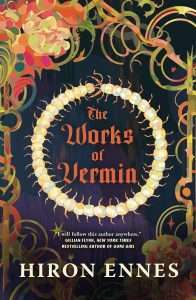 It’s hard to get across this book by describing the plot alone, but I’ll give it a shot. The city of Tiliard has been built out of the roots of a giant tree, whose roots lie in a vast toxic river. In the canopies, the city is pure decadence meets dystopian control; a city obsessed with art and excess while the secret police of the latest of the many despotic regimes eliminate any threats to its reign. In the roots, the workers strive to pay off their debts while giant insects produced by the river toxins are hunted by the city’s exterminators. One of these exterminators, Guy, is tasked with killing a new giant centipede who has a hunger for eating art and whose toxins begin to change the city in meaningful ways. Meanwhile, a woman who produces powerful toxin-based perfumes for the city’s marshal meets a mysterious gentleman from out of town whose secrets could change the city forever.
It’s hard to get across this book by describing the plot alone, but I’ll give it a shot. The city of Tiliard has been built out of the roots of a giant tree, whose roots lie in a vast toxic river. In the canopies, the city is pure decadence meets dystopian control; a city obsessed with art and excess while the secret police of the latest of the many despotic regimes eliminate any threats to its reign. In the roots, the workers strive to pay off their debts while giant insects produced by the river toxins are hunted by the city’s exterminators. One of these exterminators, Guy, is tasked with killing a new giant centipede who has a hunger for eating art and whose toxins begin to change the city in meaningful ways. Meanwhile, a woman who produces powerful toxin-based perfumes for the city’s marshal meets a mysterious gentleman from out of town whose secrets could change the city forever.
The ideas of The Works of Vermin are utterly wild and vivid. The toxins of the bizarre insects produced by the river are turned into perfumes that give gifts to the wearer: the ability to control people’s actions, or maybe just a more attractive smile. One of the most important roles of the city? The ruler’s scent-maker. The devastating building-deforming toxins used in previous intra-regime battles have changed entire areas of the city, and led to artistic movements. Then there’s the opera, where the killings on stage are very real, with those who displease the ruling chancellor being put to death to serve the cause of theatre.
Around these wild concepts, Ennes builds a story of deep satire, constantly hilariously yet deeply disturbing and utterly ruthless about what it says about the ruling classes. This is a city whose constant changes of authoritarian regime are named as art movements: from neo-revivalism to extemporism. The centrepiece for this art-obsessed city is the opera, where as I noted above revolutions are powered by stage performances that portray real killings. It’s this mix of the utterly pretentious with the shockingly brutal that powers some of the outrageous wit and whimsical grotesqueness of the satire, sort of if Waugh’s Vile Bodies was crossed with 1984.
This is all powered by Ennes’ frankly astonishing prose, already impressive in Leech, which seems to have undergone another metamorphosis in The Works of Vermin, like the monstrous centipede at the heart of the story. The result is that each page is laden with dense worldbuilding detail, creating a historical tapestry of absurd pastiche and vivid, gruesome detail on the horrific monstrosities that lurk in this world, the kind of detail that frankly will go over you head if you don’t devote the time to properly read this book, and if that sounds pretentious then perhaps I’ve been infected by the decadent spirit of Tiliard. Put it this way, it took me about four times my average to read a novel of this length. and I was devastated when it ended.
While pure satire is fun though, satire with heart is ultimately the most satisfying form of the genre and for all the tongue-in-cheek takes on the rulers, Ennes reserves deep wells of humanity for the city’s underclasses. Exterminator Guy’s attempts to create a future for his sister while surviving both their bosses and the monsters they hunt is incredibly poignant, especially when Ennes pulls off one of the greatest structural narrative reveals of modern fiction, which takes their story to new heights. I cannot emphasise enough how impressive this plot twist was: my moment of realisation of the inter-textual magic trick Ennes has done here was a book moment I will cherish forever. There is a strong undercurrent of compassion for the downtrodden yet hopeful underclasses of this book, and for all that the story is on one level a study of change—the giant centipede’s toxins literally change the city while the revolutionary movements around them change its political destiny—Ennes really seems to be suggesting that this is illusory change: hello new boss, same as the old boss, and the actual change lies in the stories of the workers’ attempts to escape their rule: whether the vermin can free themselves of the eternal plans of their pest-controlling masters. Alongside this is a deep theme of personal change: one trans character’s identify is, while never overtly discussed, nevertheless crucial to the plot, and gender fluidity flows through the city of Tiliard just as much as its river toxins.
Filled with some of the most twisted, inventive worldbuilding you’ll ever see and a perfectly poised balance of ruthless mockery of the decadent and corrupt with a well of deep humanity for those beneath them, The Works of Vermin is not just a landmark novel of dystopian satire but one of the great speculative works of the twenty-first century.
Read The Works of Vermin by Hiron EnnesThe post REVIEW: The Works of Vermin by Hiron Ennes appeared first on Grimdark Magazine.
EXCLUSIVE: Cover Reveal for Dogged by Michael R. Fletcher
Back in January of 2024 the good folks and Grimdark Magazine published a short story I wrote called The Last Wardog. When magazine editor Beth grumbled something about wanting a wardog novel I knew I had to write it. With my usual lack of forethought, planning, and whatever the other things people are supposed to do to manage large projects and build a career, I threw myself into writing. Dogged was a joke title, a place holder so I had something to call it until I figured out an actual proper name. Obviously, that never happened. Dogged is the perfect title for this fluffy-eared romp through the world of the Obsidian Path.
Being a bear of little brain, at some point I got distracted by a shiny new idea and decided that what I should really be writing is the final Obsidian Path novel. And so, I set Dogged aside and wrote The Lord of the Empty Mirror. When I finished the first draft of that project, I decided I wanted a break before diving into the edits and rewrites. I’d been world-building several novels in my spare time (epic SF, real-world horror, and perhaps a sequel to Dust of the Dead) and was having difficulty deciding which to write next. At some point I stumbled across a folder labelled Dogged and thought, ‘What the fuck is that?’ When I looked inside, I discovered half a novel!
Did I mention being a bear of little brain?
I read the half novel to see if it was any good and once again fell in love with wardogs. And so, I commissioned a cover, and decided to bring this story to life. And here it is, in all its glory.
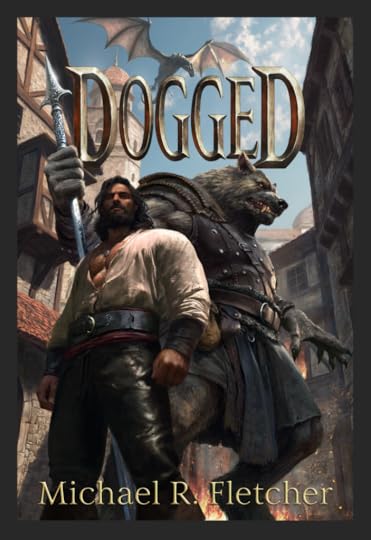
In the meantime, it turns out Adrian had his own plans for The Last Wardog, and has just released a YouTube version of the short story narrated by Colin Mace (Slow Horses, Those About to Die). I love it; check it out over on YouTube here!
A Quick Word About the ArtistI am always stalking new artists on Artstation. I love finding different styles and the search for exactly the right fit for a book is almost as fun as seeing the final product manifest in the real world. I stumbled across Tomasz Ryger while searching for artists with a flair for monsters. I have no doubt you are going to see a lot more of his work in the near future.
About Dogged by Michael R. FletcherWARDOGS ARE BORN TO DIE.
In the final days of the Demon Empire a lone wardog goes in search of the answer to the only question she cares about: Who murdered her mate?
Utterly unqualified to solve a mystery, Dogged Determination does have two advantages: She knows how to follow a trail, and she never, ever gives up.
From the heart of a massive empire to the deepest foreboding jungles, Dogged is an unstoppable force of will.
RELEASE DATE: December 15, 2025
Read Dogged by Michael R. FletcherFinding Fletch:Facebook: https://www.facebook.com/MichaelRFletcherX: @FletcherMRInsta: https://www.instagram.com/fletcher_michael_r/Bluesky: @michaelrfletcher.bsky.socialPatreon: https://www.patreon.com/michaelrfletcherYoutube: https://www.youtube.com/@mikefletcher5465The post EXCLUSIVE: Cover Reveal for Dogged by Michael R. Fletcher appeared first on Grimdark Magazine.
November 18, 2025
REVIEW: The Lost Reliquary by Lyndsay Ely
The Lost Reliquary was my first experience of reading Lyndsay Ely, but I don’t think it shall be my last. This is the dark fantasy story of Lys, a divinely blessed warrior who has sworn to kill the last living goddess. A goddess that Lys happens to be sworn to serve. I was certainly intrigued by this synopsis, and adding to those comparisons to Godkiller and Gideon the Ninth, and a cover featuring a sickle-wielding warrior, it seemed to have all the signs of being a book that a fan of darker fantasy would enjoy.
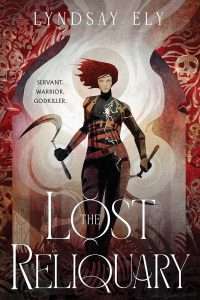 Once, the Devoted Lands were home to many gods. Now there is only one, Tempestra-Innara, the Eternal Flame. Lys was conscripted into service as a child, and to look at her, one would think she is a devoted servant of the goddess. But she is not. Lys harbours a very secret but incredibly strong desire to murder the goddess she serves. After a heretical assassination attempt nearly succeeds, Lys is sent on a secret mission with Nolan, a potentiate from a rival cloister, to recover a lost reliquary, filled with the divine blood of a fallen god. Nolan is a true believer of their goddess, devout and pious; he sees this mission as his chance to shine. Lys, however, believes it to be the only chance she will have to get her hands on a weapon that will finally be able to kill the goddess. She must feign devotion and loyalty to their cause, as they pursue a dangerous network of heretics linked to the assassination attempt, and search for the lost reliquary.
Once, the Devoted Lands were home to many gods. Now there is only one, Tempestra-Innara, the Eternal Flame. Lys was conscripted into service as a child, and to look at her, one would think she is a devoted servant of the goddess. But she is not. Lys harbours a very secret but incredibly strong desire to murder the goddess she serves. After a heretical assassination attempt nearly succeeds, Lys is sent on a secret mission with Nolan, a potentiate from a rival cloister, to recover a lost reliquary, filled with the divine blood of a fallen god. Nolan is a true believer of their goddess, devout and pious; he sees this mission as his chance to shine. Lys, however, believes it to be the only chance she will have to get her hands on a weapon that will finally be able to kill the goddess. She must feign devotion and loyalty to their cause, as they pursue a dangerous network of heretics linked to the assassination attempt, and search for the lost reliquary.
It is the snarky attitude to our main character, Lys, that gives The Lost Reliquary cause to be compared to Gideon the Ninth, so don’t pick this up expecting it to be a gothic sapphic space opera. In a segue from most fantasy now, The Lost Reliquary is devoid of a romantic subplot of any flavour. Which actually made for a pleasant reading departure. There is only one bed? I didn’t for a moment think that Nolan and Lys were about to become more intimately acquainted. Frankly, I spent most of the book thinking one of them was quite likely to kill the other.
There are also dark things aplenty going on, so there is a heck of a lot of appeal to grimdark fans. Drug dealers where the drugs are rendered human body parts? Check. Firey execution happening in the first chapter? Check. Mass murder? Check? Betrayal? Dubious morality all over the place? Check and check. The Lost Reliquary isn’t a formulaic or predictable read, but it is the sum of many good dark fantasy parts, and that should make it work for a lot of readers.
Overall, it was a good read. I wouldn’t say I was gripped from the get-go, but I was interested in the plot, the characters, and the outcome of the mission. Had the middle part of the story been a bit faster, I might feel differently, but the climactic finale did make up for that for me. I’m still on the fence about Ely’s world-building. There was a lot of detail about the structure of the cloisters and religious orders early on, which initially felt quite overwhelming, but not much else as the story progresses. Now this may be deliberate because Lys has spent most of her life sequestered in a religious order; she knows the details of that place very well, but is woefully unaware of other places. However I would have preferred to have learnt more about their world as I read.
The Lost Reliquary has a very satisfying ending, and Ely has left it on a cliffhanger, so I presume that the second novel in the series will pick up where this one leaves off. I’m invested enough to carry on with it, with the hopes that the pacing may tighten up a little now that the story is established.
Thank you to Lyndsay Ely and our friends at Saga Press for sending over a review copy of The Lost Reliquary.
Read The Lost Reliquary by Lyndsay ElyThe post REVIEW: The Lost Reliquary by Lyndsay Ely appeared first on Grimdark Magazine.
November 17, 2025
REVIEW: The Long Way Down by Craig Schaefer
The Long Way Day by Craig Schaefer is the first of the Daniel Faust books. A neo-noir urban fantasy series, Daniel Faust is very similar to the early Harry Dresden books with all of their horrific murders and black magic. Daniel isn’t a private detective, though he does do a lot of occult investigation. No, instead, Daniel is a hitman with a code. If you have been hideously wronged and the law cannot help, then he is willing to make your perpetrator suffer in such a way that death is probably the least of their worries.
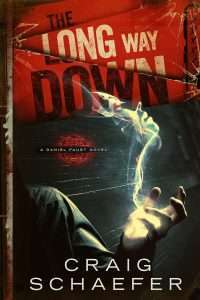 The premise for The Long Way Day gives you a good sense of how dark the books get and what sort of stories are being told: a porn star is murdered under suspicious circumstances in Las Vegas before being stuffed in a drainpipe. The victim’s father comes to Daniel seeking revenge as the police prove unwilling to do anything than label it an accident. Daniel proceeds to unravel the black magic involved as well as inflicting the maximum amount of horrifying damage he can to the guilty parties involved.
The premise for The Long Way Day gives you a good sense of how dark the books get and what sort of stories are being told: a porn star is murdered under suspicious circumstances in Las Vegas before being stuffed in a drainpipe. The victim’s father comes to Daniel seeking revenge as the police prove unwilling to do anything than label it an accident. Daniel proceeds to unravel the black magic involved as well as inflicting the maximum amount of horrifying damage he can to the guilty parties involved.
If I were to describe the series, I would go with the Dresden Files by way of LA Confidential. I’m a big fan of the latter and think that Craig Schaefer manages to capture the appropriate mixture of the grotesque with the cultured that it never becomes gratuitous. The Long Way Down manages to capture the spirit of Las Vegas and amp up the darkness contrasted to the neon glow. On one end, we have the dirty grimy criminal element, and the other has the literal forces of Hell. James Ellroy would be proud.
I really enjoyed the main character of Daniel Faust, who manages to be simultaneously likable but also guilty of numerous crimes. In a genre full of wise-cracking badasses, Daniel is extremely serious and devoted to his moral code. However, it’s a moral code that can at best be described as “flexible” what with being the hit man for hire that he is as well as the fact he willingly consorts with the very nasty forces of Hell.
I also give props to the character of Caitlin. A succubus who is enthusiastically a servant of Hell and capable of horrific acts of torture, she’s the second most likable character in The Long Way Down. She’s the kind of antihero that, alongside Daniel, makes this the kind of book that grimdark fans would enjoy. There’s a lot of excellent romantic tension, but it is the kind that I like: when you’re not sure one of the people involved will murder the other or not.
The Long Way Down is the first of a multibook series and much is set up in this volume versus being resolved as a standalone. I must give this book a lot of props, though. Craig Schaefer creates a very intricate underground community for supernaturals in his world as well as a coherent mythology. If you’re looking for an R-rated urban fantasy or occult detective series, then this is a solid place to start.
Read The Long Way Down by Craig SchaeferThe post REVIEW: The Long Way Down by Craig Schaefer appeared first on Grimdark Magazine.
November 16, 2025
REVIEW: The Witcher Season 4
It was a strange experience going into The Witcher S4. The books and games have always been great and I enjoyed the first few seasons, even if I felt it was nowhere near hitting the potential it had. On top of this, leading star Henry Cavill left the series to be replaced by Liam Hemsworth and those on the internet certainly had their opinions. Blocking out the noise, I dived into The Witcher S4 and found myself pleasantly surprised…
 The Witcher S4 starts off where the last season left off. There are three strands being followed: Geralt searching for Ciri as he believes her to be with the Emhyr who wishes to marry her and ensure a powerful bloodline, Yennefer is building an army to defeat the villainous Vilgefortz, and Ciri is living a separate life away with a band of misfits named The Rats. The writing and structure of the series has always been a bit messy – but I have to say I found this season more streamlined and easier to follow. The writing felt stronger although it still made me cringe in places with some dreadful lines somehow making it through the editing process (“School’s out!” – seriously?).
The Witcher S4 starts off where the last season left off. There are three strands being followed: Geralt searching for Ciri as he believes her to be with the Emhyr who wishes to marry her and ensure a powerful bloodline, Yennefer is building an army to defeat the villainous Vilgefortz, and Ciri is living a separate life away with a band of misfits named The Rats. The writing and structure of the series has always been a bit messy – but I have to say I found this season more streamlined and easier to follow. The writing felt stronger although it still made me cringe in places with some dreadful lines somehow making it through the editing process (“School’s out!” – seriously?).
People are going to have their opinions on Cavill being replaced by Hemsworth and it did take me an episode or two to get used to the change but for me, Hemsworth does well and his story this season is a strength. Geralt feels more human in this season and it suits Hemsworth. He makes friendships along the way as he cuts through monsters and deals with monstrous men. He makes friends with dwarves, gnomes, and an absolutely brilliant vampire (my favourite character!) and the dialogue between him and Jaskier always made me smile. Episode 5 of The Witcher S4 is one of the best that the Netflix show has put together with the friends sharing tales of their past and bringing something unique to the series. It was an episode that definitely reminded me of playing the game and that is a huge positive.
Yennefer’s story is another strength of The Witcher S4. Like Geralt’s thread, its strength is in its simplicity. Yennefer wants Ciri back and revenge on Vilgefortz. United mages, she works to bring down Vilgefortz with the power of mages old and new and it leads up to a huge magic battle with some brutal deaths that fans of grimdark will certainly enjoy. The main negative for me this season (other than some weak writing) is Ciri’s story. I’ve never been a fan of a young character getting lost and finding a young band of misfits who harp on about being free (see Stranger Things and a weird plot with Seven in season 2). The Rats, for me, were just annoying and when they were in any sense of danger I found myself hoping they would lose and never return to my screen. Thankfully, Ciri herself is still awesome – she’s an ass-kicking heroine and her fight scenes are always quality. However, there is another character that takes the spotlight for fights later in the season. Leo Bonhart. Leo is a bounty hunter who thrives on hunting witchers. Played brilliantly by the always amazing Sharlto Copley (District 9, Elysium, Oldboy), the bounty hunter is a grimdark nightmare. He is sadistic to the extreme and a character that people will love to hate and he has some of the best scenes in the series.
Despite the online backlash to casting choices, The Witcher S4 is a surprisingly streamlined, action-packed adventure that left me wanting more. With simpler stories, well-rounded characters, and a love of brutality, this season might actually be my favourite. Some fans will still hate it and I get that, but with a more human titular character, a badass sorceress, a delightful vampire, and one of the best villains on TV this year, The Witcher S4 is a fun grimdark adventure.
The post REVIEW: The Witcher Season 4 appeared first on Grimdark Magazine.
November 15, 2025
Colin Mace brings Michael R. Fletcher’s morose The Last Wardog to life on YouTube
When Michael R. Fletcher’s The Last Wardog was released in issue #37, I heard the morose howls of readers as they read this sad story of the dying war dog, The Darkest Shade of Grey, and his Packmaster, Ahira. On the losing side of a brutal siege, they try to protect their people in a final stand.
As soon as I found out Colin Mace (Slow Horses, Before We Die, Savage Hunt) had agreed to perform a short story for us for our YouTube Channel project, I knew this was the right story for his voice. He really nails the morose aspect of The Last Wardog, where we see the world through the lens of a wardog–a massive and extremely loyal pack warrior.
If you’re a dog person, this story is going to break you a bit. But don’t take my word for it, go find out using the player below, or by heading over to our YouTube channel.
More about the Grimdark Magazine YouTube ProjectIf this is the first time you’re hearing about our new YouTube project, then let me catch you up. At the start of this year, we made the decision to do something different to the rest of BookTube. We wiped all of our content–including interviews with Brandon Sanderson, Steven Erikson, and Patrick Rothfuss, among many others–and went down a new path.
We started hiring out podcast studios and camera crews and asked screen actors to bring these stories to life on screen with a live narration. The Last Wardog is our third video posted, and we have a fourth in editing which will go live before the end of 2025.
For us, this is a massive endeavor to keep driving attention to short stories and their brilliant authors, to bring them into the limelight in a different way. If this seems pretty cool to you, and you’d like to see more stories narrated by more actors, then we need your support.
Please go watch some of the videos, and then hit subscribe. Go to the Grimdark Magazine YouTube channel.
The post Colin Mace brings Michael R. Fletcher’s morose The Last Wardog to life on YouTube appeared first on Grimdark Magazine.



